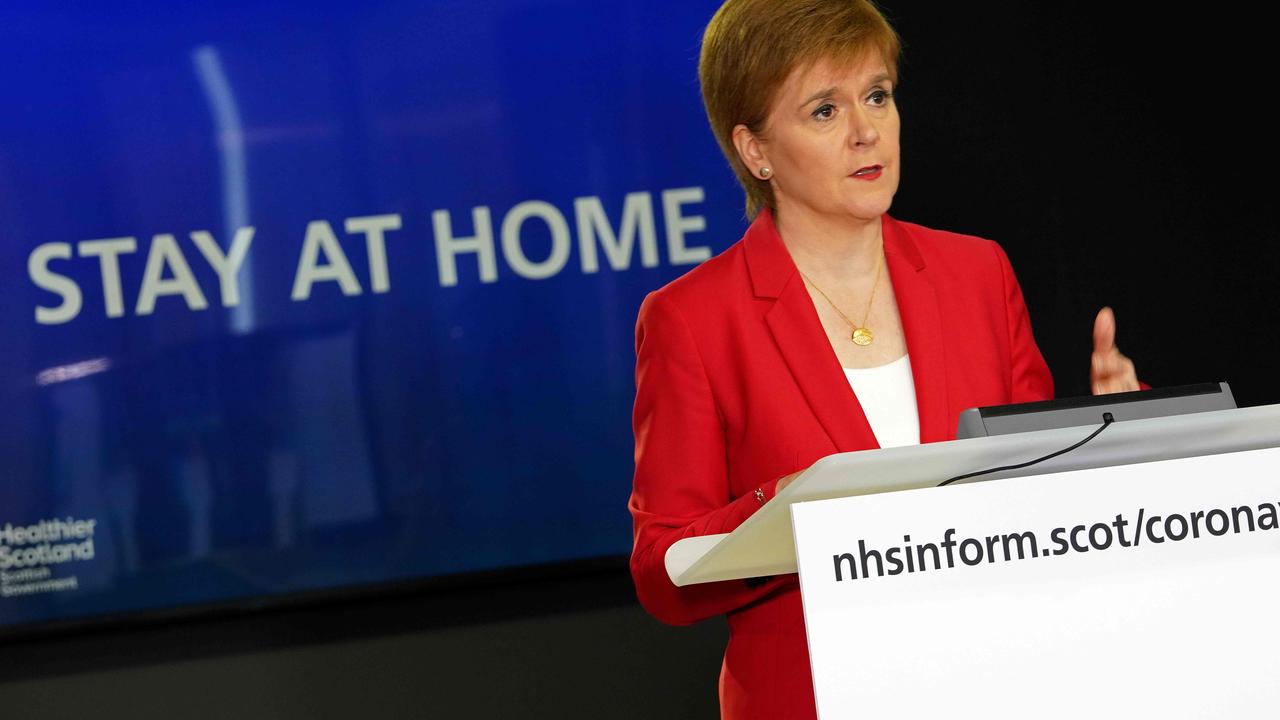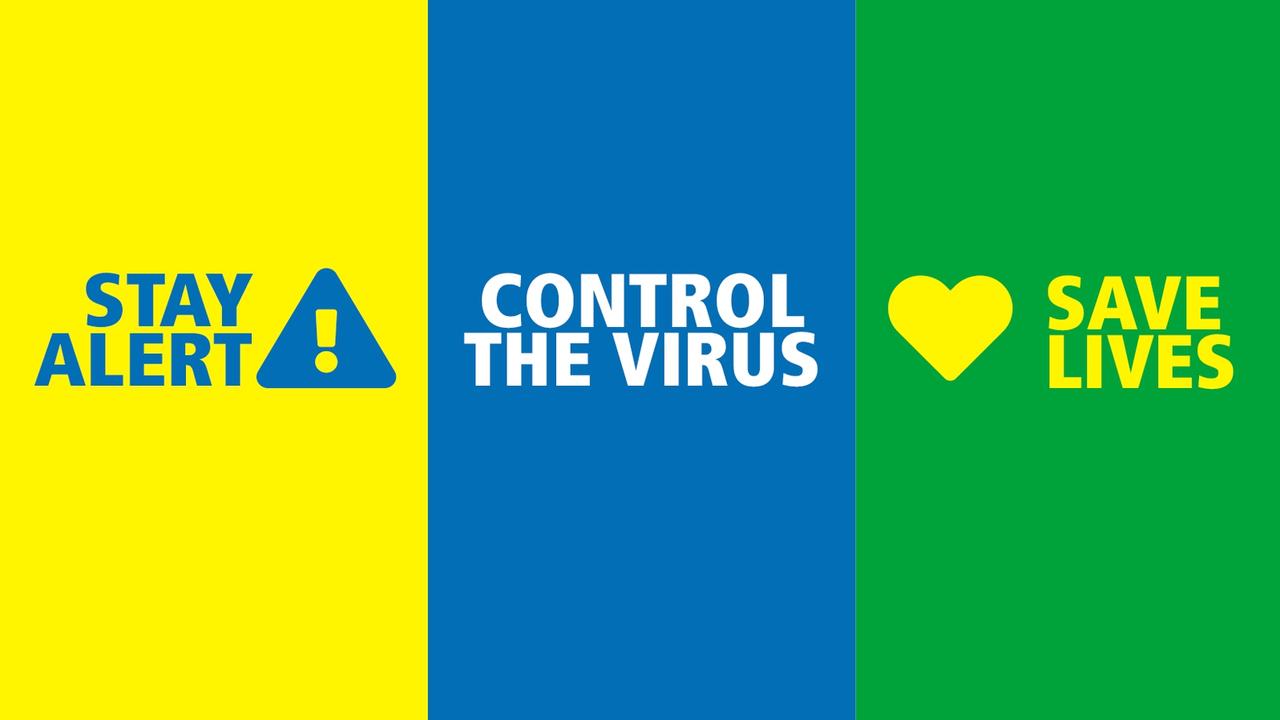Coronavirus: UK COVID-19 ‘stay alert’ advice could cause people to ‘die unnecessarily’
It’s only two words but critics have slammed a new ad campaign on how to fight coronavirus saying people may “die unnecessarily”.

It’s just two little words designed to help the public understand how to prevent the spread of coronavirus.
But the UK government’s updated slogan has been deemed so vague and “woolly” critics have said it could actually lead people to “die unnecessarily”.
And that’s not good when you’re a country that’s already seen more than 38,289 deaths and recorded 4000 new COVID-19 infections in the last 24 hours.
By any measure, Britain is not having a good pandemic.
It acted late, it has faced huge problems getting hold of basic medical equipment and testing kits, and its prime minister almost died of the virus.
The UK is currently the county worst affected by coronavirus in Europe and second worst in the world, with the death toll revised significantly upwards on Tuesday following the release of the latest official statistics.
RELATED: Follow the latest coronavirus updates
Nevertheless, Britain is narrowly easing some restrictions. Non-essential staff can return to work if they can’t work at home, shops can reopen and people can venture outside more often.
To reflect this, Downing St has updated the country’s top-level coronavirus messaging.
It was the snappy slogan: “Stay home, protect the NHS (National Health Service), save lives”.
But on Sunday, PM Boris Johnson launched a new catch cry: "Stay alert, control the virus, save lives”.

Almost immediately the new slogan – particularly the “stay alert” bit – was derided as confusing that could lead to some to believe there was a green light to leave home.
That was compounded by the fact the new logo is, indeed, green for go while “stay home” was red for definitely don’t go. Anywhere.
To make matters worse, the new slogan was accompanied by a confusing speech that outlined new guidelines without specific timings on when they should take effect, leading to a police backlash and the government’s own ministers getting the advice wrong.
If we all #StayAlert and follow the rules, we can control the virus by keeping the rate of infection (R) and the number of new cases down.
— UK Prime Minister (@10DowningStreet) May 10, 2020
Stay Alert âš ï¸
⬇ï¸
Control The Virus 📉
⬇ï¸
Save Lives 💙 pic.twitter.com/KULsVfAVyT
TV host and commentator Piers Morgan said the new messaging was “complete nonsense” and Mr Johnson’s meandering TV address to launch it was “flim flam and bluster” wrapped in “bellicose, fist-pumping rhetoric”.
Harry Potter author JK Rowling asked: “What the hell is ‘stay alert’ supposed to mean?” Is coronavirus sneaking around in a fake moustache and glasses?”
Even former South Australian Premier Mike Rann took a dig at the new ad campaign on social media.
Is Coronavirus sneaking around in a fake moustache and glasses? If we drop our guard, will it slip us a Micky Finn? What the hell is ‘stay alert’ supposed to mean? pic.twitter.com/8cUmAVBVL7
— J.K. Rowling (@jk_rowling) May 9, 2020
We have a winner. The best "stay alert, control the virus, save lives" meme prize must surely go to @cam_sf! pic.twitter.com/Sjqn3cTWCM
— Lockdown. Stay in. Save lives. (@snigskitchen) May 10, 2020
“Stay Alert, Control the Virus and Save Lives†is the UK Government’s new slogan. If the government itself had stayed alert it would have saved lives. It would have also better controlled the spread of a virus that has killed more than 32,000 people in Britain.
— Mike Rann (@Mike_Rann) May 11, 2020
‘PEOPLE WILL DIE UNNECESSARILY’
Memes have sprung up mocking the slogan and replacing it for instance with song lyrics which, some claim, make about as much sense.
The governments of Scotland, Wales and Northern Ireland pointedly made the decision to ignore Westminster’s advice on the new campaign which means it will only be rolled out in England.
"We mustn't squander progress by easing up too soon or sending mixed messages," Nicola Sturgeon, Scotland’s First Minister said.
She added that confusing messaging could even have the opposite effect, by leading COVID-19 to infect and kill more people.
"People will die unnecessarily. We must not take that risk. My basic message remains the same: please stay at home."

Within 24 hours, Mr Johnson was forced to clarify what exactly “stay alert” meant after a member of the public told him it was too “vague”.
He conceded it was a "more complicated" message than "stay at home".
“For those who think that the stay alert is not the right message, I think it is absolutely the right message for our country now,” Mr Johnson said on Monday.
He said France’s new COVID slogan “sauves des vies, restez prudents,” roughly translated as much the same advice.
Grâce à vous, le virus a reculé.
— Emmanuel Macron (@EmmanuelMacron) May 10, 2020
Mais il est toujours là . pic.twitter.com/ut8X0S4F9M
‘WISHY-WASHY’ WORDING
Marketing lecturer David Waller from the University of Technology Sydney told news.com.au that the new phrase was “an easy road to mockery”.
“You have to know what you’re alert about, but if it’s so vague you can be alert about absolutely everything.”
Mr Waller said it was a “bad choice of slogan” at a time of high anxiety and confusion.
“You need simple, straightforward, clear messaging. But when you have leaders who are verbose, who are big personalities, that can actually get in the way of messaging,” he said likening Mr Johnson’s propensity to go off script and waffle to that of US President Donald Trump.
Sally Young, a political science professor from Melbourne University, said the criticism was valid.
“It’s wishy washy – how do you stay alert for something that’s not visible?”
However, she said part of the backlash was likely against Mr Johnson for his government’s response to COVID-19.
“It has to do with context and how poorly the virus has been managed in the UK. The communication has been considered a part of that poor response,” she told news.com.au.
Whereas Britain’s political leaders of all stripes rallied around the government in the early days of the pandemic, particularly when Mr Johnson was in hospital, that consensus has begun to fracture as examples of the UK’s dithering on the issue have emerged.

AUSTRALIA’S MESSAGING CONFUSION
The UK is not alone in being criticised for poor pandemic messaging – Australia, too, has had its challenges.
In April, there was a rush on bottle shops when it became unclear if they would be forced to close.
More recently, parents have been left scratching their heads about whether schools are safe and when children should return.
In New South Wales, the lifting on some restrictions on home visits led Premier Gladys Berejiklian to have to clarify on multiple occasions how many people and under what circumstances you could pop round for lunch.
‘CITIZENS AREN’T IDIOTS’
Matt Kilcoyne, the deputy director of UK think tank the Adam Smith Institute, said messaging about going into lockdown was inherently simpler to convey than that about coming out of lockdown as the latter had more varied restrictions.
But he said Brits understood the new advice.
“(“Stay alert”) is the right balance between a repetitive and visible slogan that needs to be followed and not treating your citizens as idiots or children,” he told website PR Week.
Indeed, while Scotland’s leaders may have mocked the message from Westminster, it too is easing restrictions on movement and will allow people to stay at home less while keeping the slogan “stay at home”.
Mr Waller from UTS said the advice would have been better if it was more practical in nature: “Stay aware of social distancing,” perhaps?
Yet the fact people were slamming “stay alert” also had an upside.
“Even though it’s vague, people are talking about it,” he said.
“It’s still getting into the public arena, being discussed and that helps with people’s understanding.”




